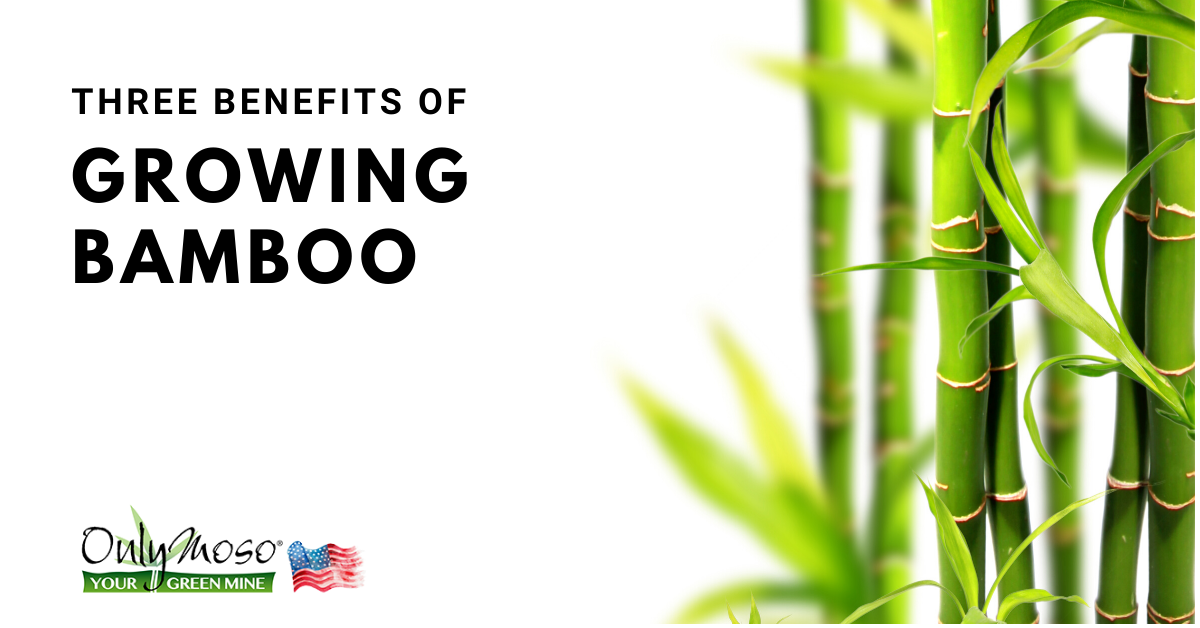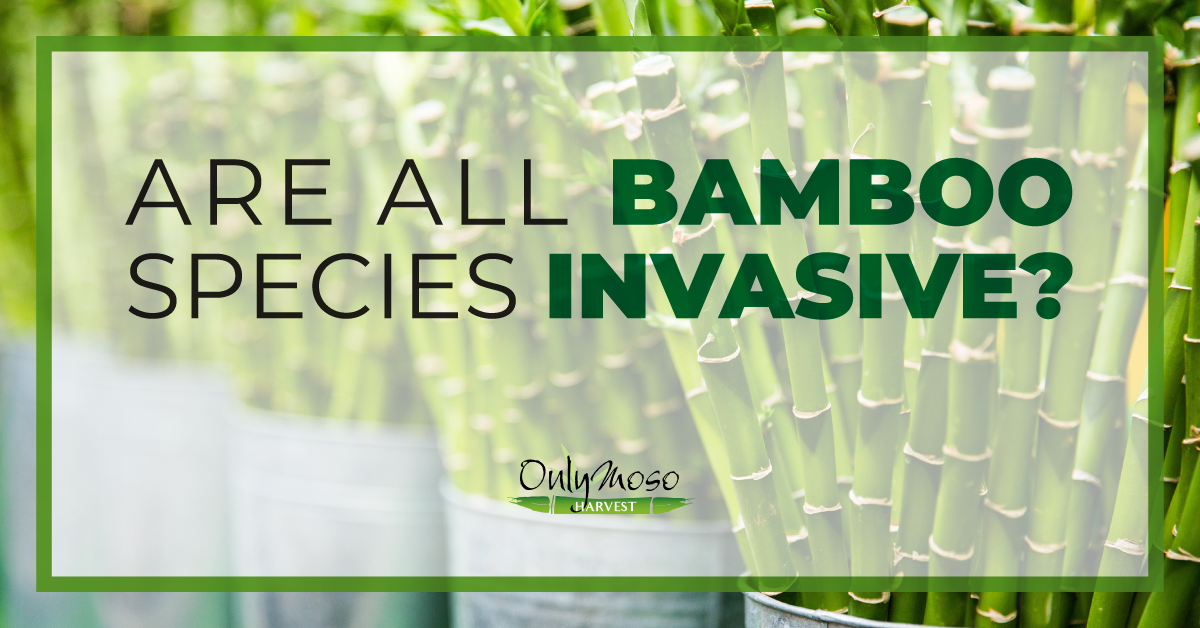We are looking for a few good farmer partners to join us on this journey!
What are the benefits of growing Bamboo? Here are THREE Big ones:

1. Environmental Benefits of Bamboo
Bamboo plantations offer an ethical environmental solution consisting of precious food, textiles and building material. Continuously falling bamboo leaves enrich the soil releasing vital rich compost, thus creating the ideal conditions for plant life to prosper. Landfills could be brought back to their original cultivation offering generous profits and materials.
One acre of Moso bamboo forest can store over 74,000 liters of water in its culms through the rainy season which gradually gets deposited back into the soil during dry season.
The extensive root system keeps soil compact, preventing erosion caused by water, and improves its quality. It grows naturally without the use of harsh chemicals/pesticides or machinery. It reduces greenhouse gases. In fact, the OnlyMoso giant bamboo absorbs 5 times more carbon dioxide and produces about thirty-five percent more oxygen than oxygen emitted by other types of trees. There are currently no GMO variants of the OnlyMoso giant bamboo.
2. Consumption of Bamboo
The shoots can be used for eating, and the wood of older canes can be treated and used as anything from landscaping to housing structures. Bamboo shoots are one of the very low-calorie vegetables. One hundred grams of fresh cane holds just 27 calories.
Bamboo heart is composed of moderate levels of soluble and non-soluble (NSP- non-starch carbohydrates) dietary fiber. 100 grams of fresh shoots provide 2.2 grams of roughage. Dietary fiber helps control constipation conditions, decrease bad (LDL) cholesterol levels by binding to it in the intestines.
Studies suggest that a high-fiber diet can help cut down colon-rectal cancer risk by protecting digestive organs from the toxic compounds in the food. Bamboo hearts are also rich in the B-complex group of vitamins such as thiamin, riboflavin, niacin, vitamin B-6 (pyridoxine), and pantothenic acid those are essential for optimum cellular enzymatic and metabolic functions.
3. Structural Benefits of Bamboo
OnlyMoso giant bamboo is a plant that grows rapidly- it can grow more than three feet per day- and can produce almost 20 times more wood, compare to the same number of traditional trees.
Bamboo can be used both as a structural scaffold and can also be used as a finishing material. Although it is a precious wood, it remains low in cost, due to the rapidity of its growth. Bamboo is used for both modern and traditional décor for parquet flooring, outdoor furniture, particleboard, textile fibers, and at the end of their life cycle for vegetable carbon.
Concerning the waste resulting from processing, every single fiber or sawdust of OnlyMoso giant bamboo is converted into pellets for heating or cooking because when it burns it does not produce smoke.
One of our farmer partners in Alabama recently planted Phyllostachys Bamboo on his new commercial bamboo farm!
Our Most Frequently asked Question:

Bamboo is a fast-growing type of woody grass that is quite often mistaken as a species of trees. It even produces leaves and grows upwards with hollow shoots. Bamboos are the largest member of the grass family with over 1,000 different species and are considered to be one of the fastest-growing plants in the world.
Most people who partake in commercial bamboo farming or plant them as a hobby, know that it is an exotic and beautiful plant that comes in a variety of colors that can brighten your landscape. This plant, however, has been known to take over the area where it has been planted – which poses the question, is Bamboo invasive?
To answer this question at a very high level – not all varieties of this Bamboo are invasive, and it is entirely dependent on the individual situation. To understand what it means to be invasive, we must evaluate the definition. Invasive: growing and dispersing easily, usually to the detriment of native species and ecosystems. In several cases, Bamboo has been used to regenerate damaged ecosystems and assisted in the return of the native flora and fauna. While bamboos are known for their aggressive growth habits, not all species of Bamboos are considered to be invasive.
What Is The Difference Between Clumping and Running Bamboo?
When discussing Bamboo, there are two categories that Bamboo falls into – either “Clumping” or “Running”:
Clumping Bamboo has a pachymorph rhizome system; this means that each branching of the rhizome turns upward, pushing through the soil surface as a fresh shoot and eventually growing into a cane/culm. Clumping Bamboo is known to gradually expand at a predictable and modest rate, which is why they are considered to be easy to maintain and non-invasive.
Running Bamboo has a leptomorph rhizome that travels outwards from the mother plant and only send vertical shots during certain seasons and weather conditions. This type of growth presents the question, “Is running bamboo invasive?”. The answer to this is not as black and white as many believe. For a crop to indeed be invasive, it has to cause harm to the native environment or be uncontrollable which through responsible management running Bamboo species are not.
However, the worry with running species of Bamboo is that because of its moderate to fast-spreading rhizome, an unmanaged stand can grow beyond its desired area. It is for this reason that Bamboo growers seeking a running species must develop a management plan the prevents this unwanted spreading. Here at OnlyMoso, we promote the responsible management of all our bamboo species through approved management practices.
Why Plant Bamboo?
There are many different reasons for planting Bamboo, whether it is for commercial use (harvested for food and fiber), as wind brakes and sound barriers, or in a wide variety of ornamental landscaping. As a result, the extensive array of Bamboo species, including ones with stalks of varying colors like red, yellow, and dark green, Bamboo can bring an explosion of color and become the center point of any landscape. Similarly, its ability to be trimmed and trained lends it to being used as natural privacy fencing or attractive hedges. Its extraordinary growth rates and dances clumping also make Bamboo an excellent windbreak or natural sound barrier that can be utilized alongside busy roadways or between field crops to prevent topsoil loss. Also, because of Bamboo’s extensive and fast-growing root system, it can be used to avoid soil erosion and nutrient runoff. For commercial food and fiber production, Bamboo’s incredible growth rates provide a sustainable, profitable, and healthy food source with bamboo shoots being one of the top five healthiest foods and a renewable source of fiber products. This amazing plant also works to lower our carbon footprint by absorbing carbon dioxide and producing 30% more oxygen per equivalent mass of trees. As a result of its ability to clean the air, many species of Bamboo make excellent house plants that both add to a home’s décor while also providing cleaner air.
OnlyMoso: Your Commercial Bamboo Farming Partner
Bamboo represents an incredible opportunity for American agriculture to grow a profitable, sustainable, and environmentally beneficial crop. Growing giant Bamboo with OnlyMoso allows farmers to plant a generational crop that can see returns as early as year three and, once established, provide a low maintenance annual revenue for 60 to 80 years. With bamboo shoots being one of the world’s top five healthiest foods and bamboo timber providing a sustainable source for lumber, fiber, and biomass, Bamboo offers multiple contrasting market opportunities. Bamboo also allows farmers to work in harmony with their land as Bamboo decreases soil erosion, balances nutrient cycles, and produces 35% more oxygen per biomass than trees.
We offer landowners and farmers the opportunity to become growing partners with OnlyMoso by providing 50% financing from our company at 0% interest on the cost of plants. Along with buyback agreements that provide a secure channel to sell your shoots and canes when they reach maturity.
Once theses lush bamboo forests become established, your farm can see an Estimated Projected Income between 25k and 38k with our Tropical Asper, 16k, and 20k with our Temperate Moso, and 18k to 22k with our P2Blue. You can find out more by visiting our website or calling us for more information at (877) 340-6755. “Your Green Mine” is just a call away!

The proof is in the pictures! These commercial bamboo canes are two inches in diameter and up to 30 feet in height!
Springling water during the cold can save commercial bamboo. This field of Dendrocalamus Asper shows evidence of how irrigation-based freeze protection can help protect young bamboo mother plants in their critical early stages.
Another spring approaches and another great harvest of Moso bamboo from our mother company in Europe!
Excellent bamboo plant management from our farmer partner in Lake Wales, FL… we used citrus pruning equipment to get the job done.
Proper planting and maintenance are the 2 major keys to a successful bamboo field!
Recent Posts
Terms & Disclosures
OnlyMoso USA Corporate Office
1398 SW 160th Ave #206
Weston, FL 33326
(877) 340- 6755
(954) 530- 3385
[email protected]
Office Hours
Mon-Fri: 9:00-5:00
Sat - Sun: Closed
